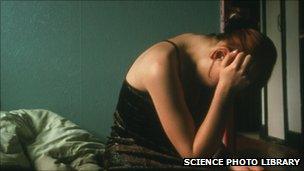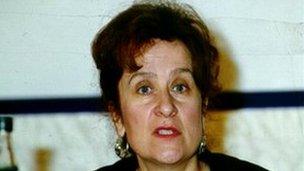Inquiry report calls for new approach on trafficking
- Published

A total of 74 people are suspected of having been trafficked into Scotland since April 2009
Scotland should pioneer a new approach to the problem of human trafficking, according to an inquiry headed by the leading QC Baroness Helena Kennedy.
Her report, to be published in Edinburgh, says a new system should be in place before the 2014 Commonwealth Games.
Baroness Kennedy makes 10 recommendations, including a call for new legislation.
She said this would enable more prosecutions to be made.
The inquiry was carried out for the Equality and Human Rights Commission (EHRC).
It concentrated on the trafficking of women for commercial sexual exploitation, but also looked at forced labour and domestic servitude.
Baroness Kennedy called people trafficking "a human rights abuse of terrible consequences".
She said trafficking women into the sex trade was "the most prevalent and pernicious manifestation of human enslavement".
Latest figures show a total of 74 people - 19 of them children - are suspected of having been trafficked into Scotland since April 2009.
The EHRC said these were almost certainly an under-estimate because of the reluctance of many victims to come forward or give evidence in cases which can be investigated.
But there has been criticism of official attitudes to the problem.
The head of the UK Border Agency in Scotland, Phil Taylor, said in June 2011 that the length of time it takes to investigate cases has meant there have been few brought to court.
He told a conference in Edinburgh: "The real worry is if you never take a case to trial, you will never get a conviction."
There has only been one prosecution in Scotland for human trafficking, compared with more than 150 in England and Wales.
Mr Taylor welcomed the report, saying the trafficking of people was "horrendous".
He said the UKBA would study the report closely and "consider seriously any recommendations made".
'Modern slavery'
Baroness Kennedy's report calls for a victim-centred approach to trafficking in Scotland.

Baroness Kennedy's inquiry report recommends a new approach on human trafficking
She wants information and intelligence about cases to be shared more systematically, and said there should be a new Scottish act specifically to target the crime.
Her investigation found human trafficking in Scotland came from demand for cheap labour and was often associated with organised crime gangs.
Yet it pointed out there was little public or professional awareness of cases.
Kaliani Lyle, EHRC Scotland commissioner, said: "Human trafficking operates below the radar and is kept there through fear and deception.
"The experiences of those who are trafficked here are often nothing short of brutal and, in the main, they are carefully hidden from society."
She added: "Our challenge is to work together to rid Scotland of this modern slavery and to put anti-trafficking firmly on the agenda of key regulators."
Justice Secretary Kenny MacAskill called trafficking a "horrific violation of human rights" that the country would not tolerate.
Speaking ahead of the EHRC launch, Mr MacAskill said: "The Scottish government welcomes this inquiry and the extensive work that Baroness Kennedy has undertaken to expose the unacceptable and atrocious practices which allow human trafficking to persist.
"We wholeheartedly support the fight against trafficking and are committed to working with others to ensure that it is eradicated in Scotland."
- Published3 October 2011
- Published14 March 2011